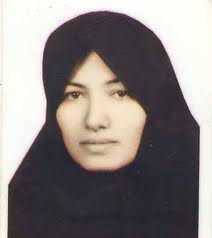Monday
Aug302010
Iran: The Regime Feels the Pressure on Stoning
 Monday, August 30, 2010 at 18:24
Monday, August 30, 2010 at 18:24  Who says that international campaigns have no effect?
Who says that international campaigns have no effect?Last week, speaking to a journalist, I said that I had the sense that the Iranian Government was getting rattled over the international attention to the case of Sakineh Mohammadi Ashtiani, the 43-year-old woman sentenced to death, initially for adultery and then for complicity in the murder of her husband. Reactions against the sentence this summer had already pushed Tehran into declaring that the carrying out of the death sentence had been held up and that it would not be by stoning; however, the prospect remained that Ashtiani would die by hanging.
A few days ago the Government confirmed my suspicions through two linked statements. The judiciary tried to explain that, while it protected the rights of all citizens, Ashtiani had been tried fairly and convicted on the weight of evidence. The Iranian Foreign Ministry complained, with notable irritation, about "foreign interference".
Earlier today we noted Foreign Minister Manouchehr Mottaki's ill-tempered response to the magazine Der Spiegel, ruling out German criticism of stoning because the country had killed millions of people under a totalitarian regime. And speaking of ill-tempered, Keyhan has called Carla Bruni, the singer and wife of French President Nicolas Sarkozy, a "prostitute" for joining activists in asking for clemency for Ashtiani.
But it is the high-profile conservative newspaper Tabnak that gives the most telling testimony today. The publication, linked to Mohsen Rezaei, the Secretary of the Expediency Council and 2009 Presidential candidate, carries out a full review of the case.
Tabnak does not say the sentence should be reversed; however, it frets about the criticism of Iran from sources as varied as Brazilian President Luiz Inacio Lula da Silva and Catherine Ashton, the foreign policy representative of the European Union. In light of the attempt by the "West" to "mobilise public opinion against Iran", Tabnak insists "the country's authorities should seriously watch the next move by the West and not ignore it".
The take-away quote (hat tip to an EA correspondent):
Would it not be better if, right from the beginning, we showed more diligence in issuing stoning sentences rather than incurring the great cost of changing the sentence to execution?
The statement from the Council of Human Rights of the Judiciary was well able to reveal the reality of this case and they must be thanked. However, it must be accepted that this came about very late in the day. If only in those first days of the western media campaign an official had made this statement in an interview with one of the major international media.
Stay tuned....


